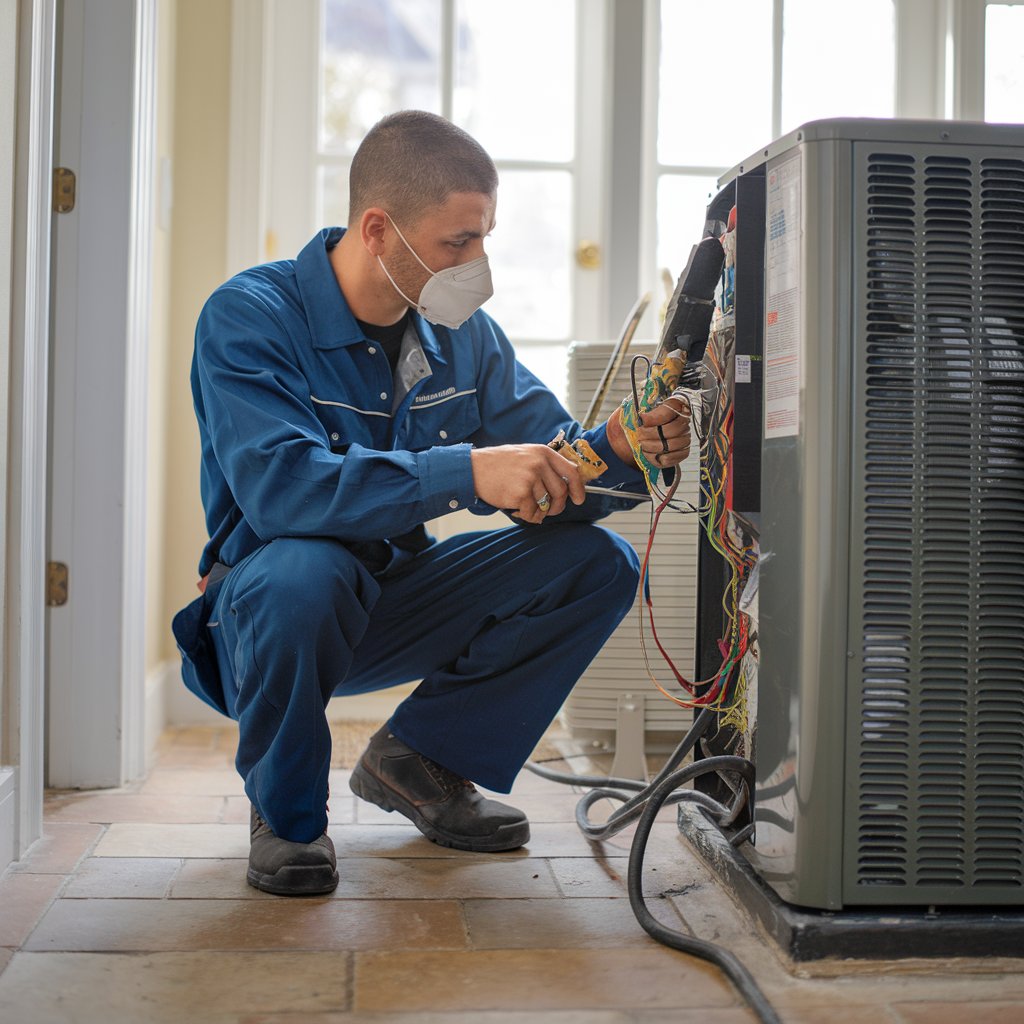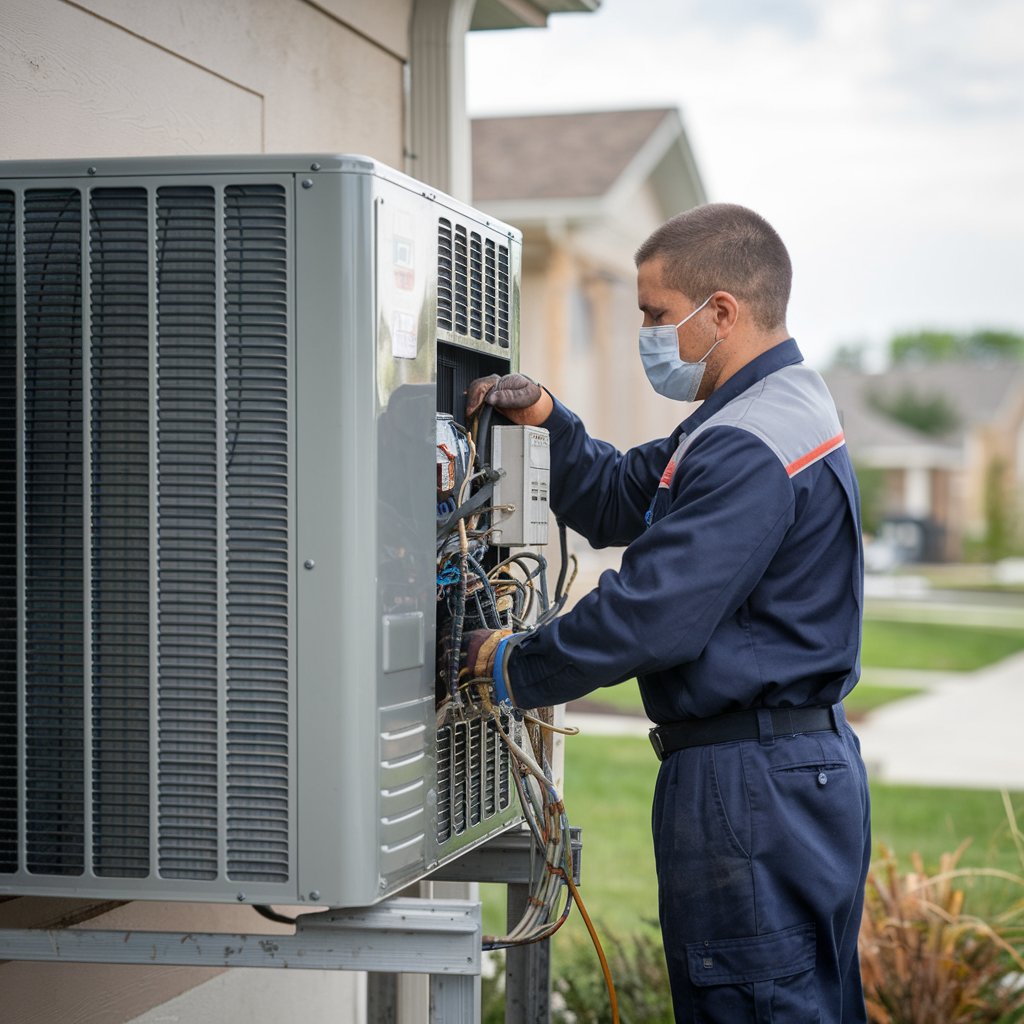There’s nothing quite like stepping into a home that feels just right—the air is fresh, the temperature is perfect, and you can truly relax. Achieving that level of comfort and wellness depends on one unsung hero: your HVAC system. It not only regulates temperature but also improves the air you breathe and supports quality sleep—two keys to living a healthier, happier life.
But like any home system, an HVAC unit needs care to perform its best. From ensuring cleaner air to creating ideal sleeping conditions, a well-maintained HVAC system is the cornerstone of a comfortable and refreshing living space.
The Connection Between HVAC Maintenance and Indoor Air Quality
Your home’s HVAC system does more than regulate temperature—it’s also your first line of defense against poor indoor air quality. It filters out allergens, dust, and other pollutants to help maintain a clean and healthy environment. However, without regular maintenance, these systems can become clogged or inefficient, circulating harmful particles instead of eliminating them.
How Poor Indoor Air Quality Affects Your Health
- Respiratory Issues: Pollutants like dust and mold can exacerbate asthma and allergies.
- Fatigue and Irritation: Prolonged exposure to pollutants like dust and mold can lead to headaches, fatigue, and throat or eye irritation.
- Long-Term Risks: Studies show that consistent exposure to indoor pollutants can contribute to chronic respiratory conditions.
The impact of poor indoor air quality extends far beyond discomfort. Poor air can aggravate allergies, trigger respiratory issues, and even affect overall well-being.
According to the EPA, Americans spend approximately 90% of their time indoors, where certain pollutants are two to five times more concentrated than outdoors. This makes maintaining clean indoor air a crucial part of living a healthy, comfortable life.
When HVAC filters and ducts are regularly cleaned, they work efficiently to reduce contaminants and allergens in the air, creating a healthier home environment. Neglecting this simple upkeep can lead to a buildup of irritants that may compromise your health and the overall air quality of your space.
Better Air, Better Sleep: How Temperature and Air Quality Affect Rest
The quality of your sleep hinges on two often-overlooked factors: air quality and room temperature. Poor air quality can disrupt sleep by causing congestion, dryness, or respiratory irritation, while the wrong temperature can leave you tossing and turning all night. A well-maintained HVAC system can address both issues, creating a sleep environment that fosters rest and recovery.
Why Air Quality Matters for Sleep
- Allergens like dust, pet dander, and mold can irritate your airways, leading to restless nights.
- Poor ventilation can increase the concentration of indoor pollutants, affecting your ability to breathe comfortably.
- Dry air can cause throat irritation and worsen snoring, while excessively humid air promotes discomfort.
- Did you know? The ideal indoor humidity level for sleep is between 30% and 50%. Humidity levels below 30% can dry out your skin, throat, and nasal passages, while levels above 50% can create a stuffy environment and encourage the growth of mold, dust mites, and bacteria. Levels outside this range can significantly disrupt restful sleep and overall comfort. Maintaining optimal humidity not only prevents mold and dryness but also promotes deeper, uninterrupted sleep by creating a more comfortable and breathable environment.
The Ideal Sleep Temperature
- Experts recommend keeping your bedroom between 60 and 67 degrees Fahrenheit for optimal sleep.
- A good HVAC system ensures consistent temperature control, eliminating sudden spikes or drops that disrupt your rest.
- Balanced humidity levels, controlled by your HVAC system, further enhance comfort by preventing stuffiness or excessive dryness.
Imagine waking up without a stuffy nose, scratchy throat, or feeling overheated—your HVAC system can make that a reality. Regular maintenance can deliver clean, fresh air and a stable temperature, helping you wake up refreshed and energized and one step closer to becoming a morning person.
Simple Steps to Maintain Your HVAC System for Cleaner Air
Caring for your HVAC system doesn’t have to be complicated. By focusing on a few essential tasks, you can ensure it runs efficiently while keeping your home’s air clean and comfortable. Regular maintenance not only helps the system perform at its best but also extends its lifespan, saving you time and money.
Your HVAC Maintenance Checklist:
✅ Replace Filters Regularly: Dirty filters are a major culprit for poor air quality. Replace filters every 1 to 3 months, depending on usage and filter type.
✅ Schedule Professional Inspections: A technician can identify issues like leaks, worn components, or buildup in your ducts that aren’t easily visible.
✅ Clean Vents and Registers: Dust and debris in vents can block airflow and circulate allergens. Wipe them down regularly to keep your air clean.
✅ Check for Unusual Noises or Odors: These can indicate mechanical problems or mold growth in your system. Taking quick action to address them can help prevent bigger problems from developing.
Additional Tips for Better Air Quality:
✅ Invest in a Quality Air Filter: Choose HEPA filters or filters designed to trap allergens for a noticeable improvement in air quality.
✅ Monitor Humidity Levels: Use a humidifier or dehumidifier to maintain indoor humidity between 30% and 50%, especially during extreme weather.
By following this checklist, you can keep your HVAC system in peak condition while improving the air quality and comfort of your home.
The Role of Education in Understanding Your HVAC System
When it comes to maintaining your HVAC system, knowledge is power. A deeper understanding of how these systems work and the importance of proper care can empower homeowners to take control of their indoor climate and enhance their comfort and well-being. HVAC education programs provide valuable insights into system functionality, maintenance best practices, and energy efficiency.
Comparing HVAC Education Across States
The availability and focus of HVAC education vary across the United States, influenced by climate, regional needs, and industry trends.
Table: HVAC Education Across States
| State | Climate Impact | Focus of HVAC Education |
| Alabama | Hot, humid summers and mild winters require robust cooling systems and air quality management. | Emphasizes residential cooling efficiency and air quality improvements. |
| Florida | Tropical climate makes energy-efficient cooling systems a priority. | Focuses on reducing energy consumption in year-round AC usage. |
| Texas | Diverse climate with both dry and humid regions requires versatile HVAC knowledge. | Stresses adaptability and maintenance for varying conditions. |
| California | Varied climates demand energy-efficient systems for both heating and cooling. | Highlights sustainable practices and new technologies like solar-integrated systems. |
| New York | Cold winters and humid summers make HVAC systems critical year-round. | Prioritizes advanced heating technologies and smart systems for efficiency. |
This comparison highlights the tailored approaches states take to HVAC education. Alabama’s emphasis on air quality and humidity management uniquely addresses the challenges of its hot, humid climate. These specialized programs ensure that residents and technicians alike are equipped to maintain comfortable and healthy living spaces year-round.
Why HVAC Education in Alabama Matters
For homeowners in Alabama, understanding the nuances of HVAC systems is especially important. The state’s humid climate can exacerbate indoor air quality issues, requiring tailored strategies for maintenance and system upgrades. Pursuing HVAC education in Alabama equips individuals with valuable knowledge to better understand their systems, make informed decisions, and improve the functionality and overall atmosphere of their living space.
With the right education, Alabama homeowners can effectively manage the challenges of maintaining comfortable, healthy living spaces, even during extreme seasonal changes.
Take Charge of Your Home’s Comfort and Wellness
Your home is more than just a place to live—it’s your sanctuary. A well-maintained HVAC system plays a vital role in keeping it comfortable, healthy, and inviting. From ensuring cleaner air to creating the perfect temperature for relaxation and better sleep, regular HVAC care delivers undeniable benefits for both your physical and mental well-being.
Beyond comfort, taking the time to understand and maintain your HVAC system can reduce energy costs, extend the system’s lifespan, and contribute to a more sustainable home. Simple actions like changing filters, scheduling inspections, and learning about best practices can have a transformative impact—not just on your living environment but on how you feel every day.
By prioritizing your HVAC system, you’re not just maintaining your home—you’re creating a sanctuary for health, comfort, and relaxation. Start making these small changes today, and see how a little care for your HVAC system can make a big difference in your everyday life.





